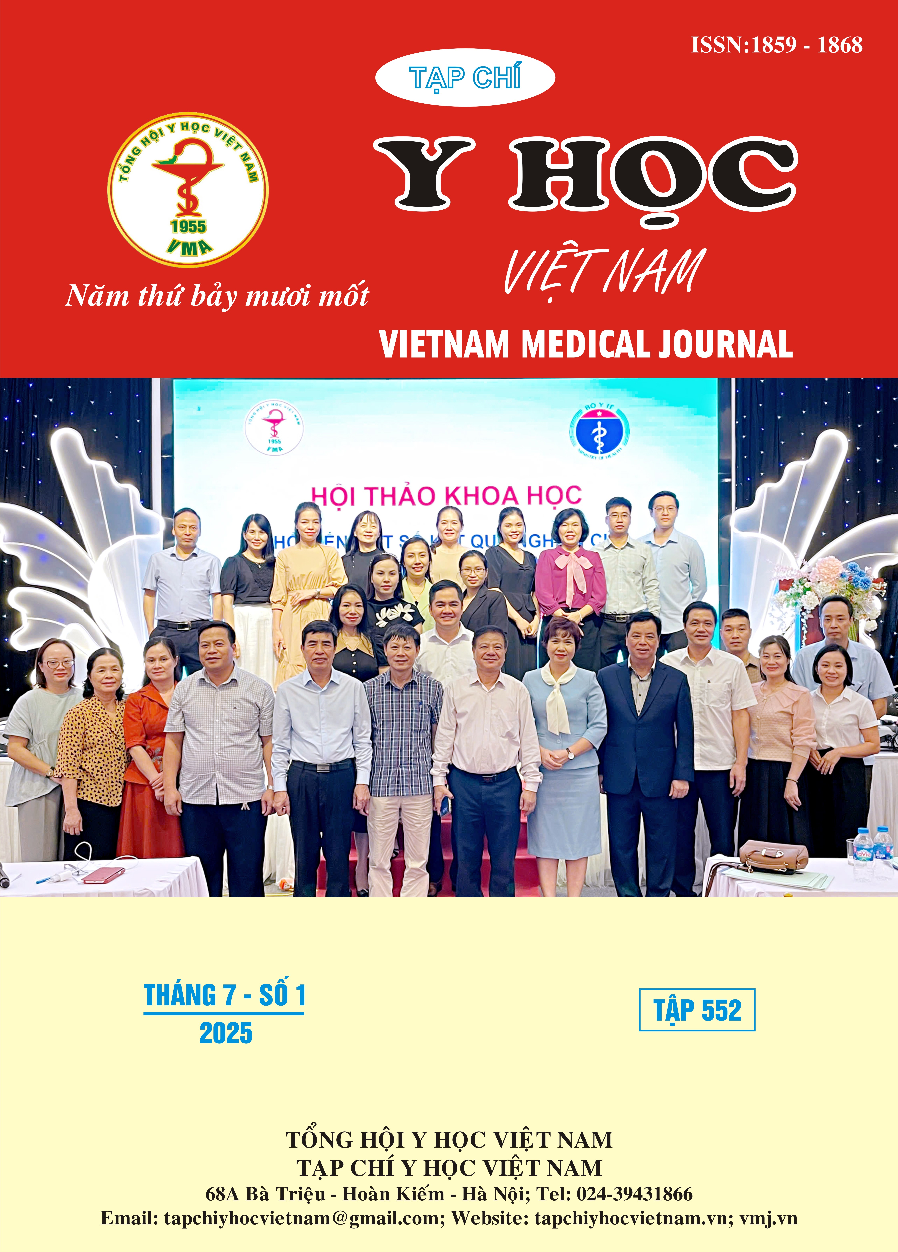ĐÁNH GIÁ KẾT QUẢ BƯỚC ĐẦU ĐIỀU TRỊ GIẢI MẪN CẢM TRƯỚC GHÉP BẰNG THAY HUYẾT TƯƠNG TẠI BỆNH VIỆN HỮU NGHỊ VIỆT ĐỨC
Nội dung chính của bài viết
Tóm tắt
Đặt vấn đề: Ghép thận là phương pháp điều trị tối ưu cho bệnh nhân suy thận mạn giai đoạn cuối. Tuy nhiên, nguồn thận hiến khan hiếm khiến danh sách chờ ghép ngày càng dài. Sự tồn tại kháng thể kháng HLA đặc hiệu người hiến (DSA) là rào cản lớn, làm tăng nguy cơ thải ghép. Các chiến lược giải mẫn cảm, đặc biệt là thay huyết tương (PEX), được áp dụng nhằm loại bỏ DSA và mở rộng cơ hội ghép thận. Đối tượng- phương pháp nghiên cứu: Hồi cứu mô tả 09 trường hợp ghép thận từ người hiến sống có DSA được giải mẫn cảm bằng PEX tại Bệnh viện Hữu Nghị Việt Đức từ 01/2017 đến 10/2023. Kết quả: 100% bệnh nhân được ghép thành công sau giải mẫn cảm bằng PEX. Chức năng thận cải thiện tốt, không có trường hợp thải ghép cấp hay thận ghép chậm chức năng. Sau thời gian theo dõi trung bình 25,67 tháng, 100% bệnh nhân còn sống với chức năng thận ổn định. Kết luận: Giải mẫn cảm bằng thay huyết tương trước ghép là phương pháp hiệu quả, an toàn, giúp mở rộng nguồn thận hiến ở bệnh nhân có DSA. Cần tiếp tục nghiên cứu để tối ưu chi phí và giảm biến chứng.
Chi tiết bài viết
Từ khóa
ghép thận, giải mẫn cảm, DSA, thay huyết tương
Tài liệu tham khảo
2. Malvezzi, P.; Jouve, T.; Noble, J.; Rostaing, L. Desensitization in the Setting of HLA-Incompatible Kidney Transplant. Exp. Clin. Transpl. 2018, 16, 367–375.
3. Jordan SC, Toyoda M, Kahwaji J, Vo AA: Clinical aspects of intravenous immunoglobulin use in solid organ transplant recipients. Am J Transplant. 2011;11:196-202.
4. Orandi BJ, Luo X, Massie AB, et al. Survival benefit with kidney transplants from HLA-incompatible live donors. N Engl J Med. 2016; 374:940–950.
5. Kuppachi, S., & Axelrod, D. A. Desensitization strategies: is it worth it? Transplant International. 2020; 33(3):251-259.
6. Jamilya Saparbay1, Mels Assykbayev, et al. Desensitization in kidney transplantation: Review. J Clin Med Kaz. 2021; 18(6):32-34.
7. Pérez-Flores I., Skhángago J.L., Calvo-Romero N., Barrientos-Guzmán A., Sánchez-Fructuoso A.I. Different Impact of Pretransplant anti-HLA antibodies Detected by Luminex in Highly Sensitized Renal Transplanted Patients. BioMed Research International. 2013; Article ID 738404, pp.1-5
8. Campos É.F., Tedesco-Silva H., Machado P.G., Franco M., Medina-Pestana, Gerbase-DeLima M. Post-Transplant Anti-HLA Class II Antibodies as Risk Factor for Late Kidney Allograft Failure. American Journal of Transplantation; 2006; (6), pp.2316–2320.
9. Mohit Chowdhry, Ayushi Yadav, et al. Role of therapeutic plasma exchange as a desensitization therapy in human leukocyte antigen incompatible renal transplant patients: A single-center experience. Hematology, Tranfusion and cell therapy; 2022, xxx(xx):1-7.
10. Stanley C. Jordan*, Jua Choi, and Ashley Vo. Kidney transplantation in highly sensitized patients. British Medical Bulletin, 2015, 114:113–125.


